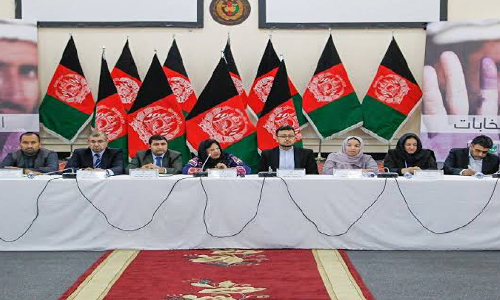Remaining less than one week to the preliminary election result announcement, many Afghan people including Electoral Complaints Commission are concerned about the repeated delay of election schedule. Last Thursday, Electoral Complaints Commission warned the Independent Election Commission against further delaying the results. Originally, the preliminary election result was supposed to be announced on October 19 but the election commission failed to meet the deadline. So, it was postponed to a second deadline which is November 14 but probably Independent Election Commission (IEC) will again miss the deadline as one day ago it was announced that out of 26,000 polling stations, the votes of 8,494 stations will be re-counted. Therefore, many Afghans are not only worried about a transparent election outcome, but also concerned about future of Afghanistan’s young democracy.
Undoubtedly, democracy is the most important factor in stabilization and development of post-conflict countries, but it has not produced a good result in Afghanistan. Afghan citizens eagerly wanted to move towards peace and prosperity through democratic system, but now after nearly two decades of hopes and optimism everyone is disappointed about its functionality in Afghanistan. People expected to reach some of their dreams thorough implementation of democratic values, it often challenged by IEC poor performance. Therefore, the main responsibility this failure which many lead to a crisis will be on the shoulder of IEC.
The Independent Election Commission officials say that their delegations have just started traveling to provinces to begin the recounting process, but the fact is that after more than a month waiting IEC could not announce the result of less than 2 million votes. In comparison to other countries which use similar technology they are able to announce about 100 million votes within 24 hours. But in Afghanistan due to an unsolved “technical delay,” the results won’t be released until November 14 which was previously scheduled for November 7. According to the Independent Election Commission (IEC), the data collected by the biometric voter verification (BVV) devices are still being processed.
Though it is the first time that IEC has used the BVV system to monitor the election process, it has national supports and international technicians who had been successful in their own countries. The IEC’s new measures came after a “boycott threat” in late July when the Council of Presidential Candidates issued a statement warning that they would boycott the election and warned against the possibility of it being influenced by fraud. They called for a transparent election with the assistance and monitoring of the Election Support Group, including the European Union, Australia, Sweden, Germany, Japan, the UK, and the U.S. In this case, it was highly necessary for IEC to use BVV, which uses fingerprints and eye and facial recognition, to verify the voters ensure a clean election.
However, the IEC’s stance of insisting on the BVV devices faces a dilemma, if unverified votes are not counted, then the result might be influenced by the technical procedures, given that some BVV might have malfunctioned, especially in remote and mountainous voting areas, which would have left many disenfranchised. Yet, if the unverified votes are counted, it might open the door for the fraudulent votes being mixed with “clean” ballots, and eventually influence the fairness of the election overall.
According to some experts, in addition to the issue of biometric devices, the interference of national and international actors is also blamed for the confusions. Every country is trying to push its favorite candidates but the main responsibility is returned to impartiality of IEC. If the IEC stays on a clear position, no power can change fate of Afghan people. The IEC should understand that the future of Afghanistan depends on its impartial commitment and performance. Thus, the IEC members should note that the presidential was held with great human and non-human expenses.
During the Election Day dozens of innocents civilians were killed or intimidated but the brave Afghans accepted the serious risks hoping to play a role in construction of their country. The Taliban threatened Afghan civilians against voting because the elections would only meet the demands of “a limited number of politicians, resulting in the waste of time, money and resources. Even the presidential candidates had to reconsider the threats imposed from the Taliban and so some of them stopped campaigning in some provinces while spoke to his supporters via video conferences instead.
Unlike the dream of Afghan citizens, the biggest uncertainty of the election comes from the future of the government. The Taliban has been accusing the U.S. presence in Afghanistan as “occupation forces” and defining the Afghan government as “puppet government” controlled by Washington. The negotiations between the U.S. and the Taliban in Doha is underway and it is difficult for the U.S. to decide which is the priority – to support the government of Afghanistan, or to make peace with the Taliban through key concessions, especially through forming an interim government led by the Taliban.
Thus, it is still uncertain whether the future government resulted from this election will be able to maintain itself, or might it become a bargaining chip for the U.S. in the negotiation with the Taliban for the decent withdrawal from Afghanistan. According to the U.S. ambassador to Afghanistan, John Bass, it is of “highest priority” to keep peace in Afghanistan. Not only the U.S. officials but also some of Afghan political leaders have expressed that peace is paramount for the region.
Home » Opinion » Why Afghan preliminary election result is repeatedly postponed
Why Afghan preliminary election result is repeatedly postponed
| Mohammad Zahir Akbari

